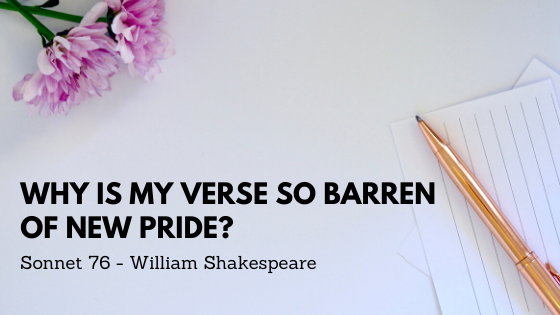Sonnet 76 – Why is My Verse So Barren of New Pride
Why is my verse so barren of new pride?
So far from variation or quick change?
Why with the time do I not glance aside
To new-found methods, and to compounds strange?
Why write I still all one, ever the same,
And keep invention in a noted weed,
That every word doth almost tell my name,
Showing their birth and where they did proceed?
O, know, sweet love, I always write of you,
And you and love are still my argument;
So all my best is dressing old words new,
Spending again what is already spent.
For as the sun is daily new and old,
So is my love still telling what is told.
~ by William Shakespeare
My Story
If William Shakespeare was my bestie, and if he had read this sonnet in front of me, saying:
“Why is my verse so barren of new pride?
So far from variation or quick change?
Why with the time do I not glance aside
To new-found methods, and to compounds strange?”
I, probably, would have punched him on his face and said, “Had your verse been up-to-date with the ‘new-found methods’ and the ‘compounds-strange’, you wouldn’t have been ‘the William Shakespeare’ that you are today. You idiot! Let every word ‘doth’ tell your name”. Yet I can only dream that any of my people be even close to what William Shakespeare was.
Yet everyone has someone in their lives, who know the real you and can identify things done by you, even if you do that anonymously, using the incognito mode. I know a few of them. I have been writing for quite a while now. But still, I haven’t been able to develop a style of writing yet, that every word ‘doth’ tell my name. But still, some people can identify if a piece was written by me, even if it is typed (because of the spelling and grammatical errors in them).
Once I had to write a play for our college. It was my first time. I wanted a review at home before it goes out to people of our cultural society. But I knew my mother used to get too critical of my work. So, I told her that this script was written by a friend of mine, and I asked her to give her opinion. I left the print-out of the script at the table. I knew she won’t know as I had already run a grammar-check software.
When I came back home, the first thing she asked me was if I had written the same. I hesitantly said “no”. But I knew, maybe I had done some mistake. So. the next thing I asked was how did she know. She said because of the curtain closing music I had written.
So, I had written:
“Ta-Ta-Ta–Ta-TaDa–Ta-TaDa”
And my mother could imagine the Vader-entry music running through my mind while writing this. A star-war reference.
This time, caught I was……
William Shakespeare

Shakespeare was born and raised in Stratford-upon-Avon, Warwickshire. At the age of 18, he married Anne Hathaway, with whom he had three children: Susanna and twins Hamnet and Judith. Sometime between 1585 and 1592, he began a successful career in London as an actor, writer, and part-owner of a playing company called the Lord Chamberlain’s Men, later known as the King’s Men. At age 49 (around 1613), he appears to have retired to Stratford, where he died three years later. Few records of Shakespeare’s private life survive; this has stimulated considerable speculation about such matters as his physical appearance, his sexuality, his religious beliefs, and whether the works attributed to him were written by others.
Shakespeare produced most of his known works between 1589 and 1613. His early plays were primarily comedies and histories and are regarded as some of the best work produced in these genres. Until about 1608, he wrote mainly tragedies, among them Hamlet, Othello, King Lear, and Macbeth, all considered to be among the finest works in the English language. In the last phase of his life, he wrote tragicomedies (also known as romances) and collaborated with other playwrights. Many of Shakespeare’s plays were published in editions of varying quality and accuracy in his lifetime. However, in 1623, two fellow actors and friends of Shakespeare’s, John Heminges and Henry Condell, published a more definitive text known as the First Folio, a posthumous collected edition of Shakespeare’s dramatic works that included all but two of his plays. The volume was prefaced with a poem by Ben Jonson, in which Jonson presciently hails Shakespeare in a now-famous quote as “not of an age, but for all time”.
Throughout the 20th and 21st centuries, Shakespeare’s works have been continually adapted and rediscovered by new movements in scholarship and performance. His plays remain popular and are studied, performed, and reinterpreted through various cultural and political contexts around the world.
To read more about William Shakespeare, click here.
Sonnet 76 – Poem Analysis
There are somethings that can never change. William Shakespeare’s writing style was one of them. This is sonnet number 76. He had written a lot before and hadn’t seen much change in the way he writes.
The speaker of the poem seems a bit concerned with the fact that his style of writing isn’t up-to-date with the new style of writing. Yet he seems to have accepted the fact that it can’t be changed, as it reflects him and his true feelings.
He speaks about his muse and his love for him, that he can’t find absolutely anything else to write about. I think a lot of writers who write love stories would be able to relate to this but writing them is so difficult. There is nothing about love that hasn’t been written or told yet. All you can do is “dress old words new”. Also, the fact that, in love, nothing ever changes. So, every time you must tell something, you’re “still telling what is told”.
You Might Also Like:
Fear No More The Heat O’The Sun | A poem by William Shakespeare
To read more famous poems by the finest writers ever, click here.









Beautiful poem!
And as always your version never fails to bring a smile on the reader’s face:)
Wonderful sonnet! He, his style and dramas, sonnets will be eternal, indeed. I love his artworks. Thank you for sharing it. 😊